In short, our gentleman became so caught up in reading that…with too little sleep and too much reading his brains dried up, causing him to lose his mind.
Miguel de Cervantes
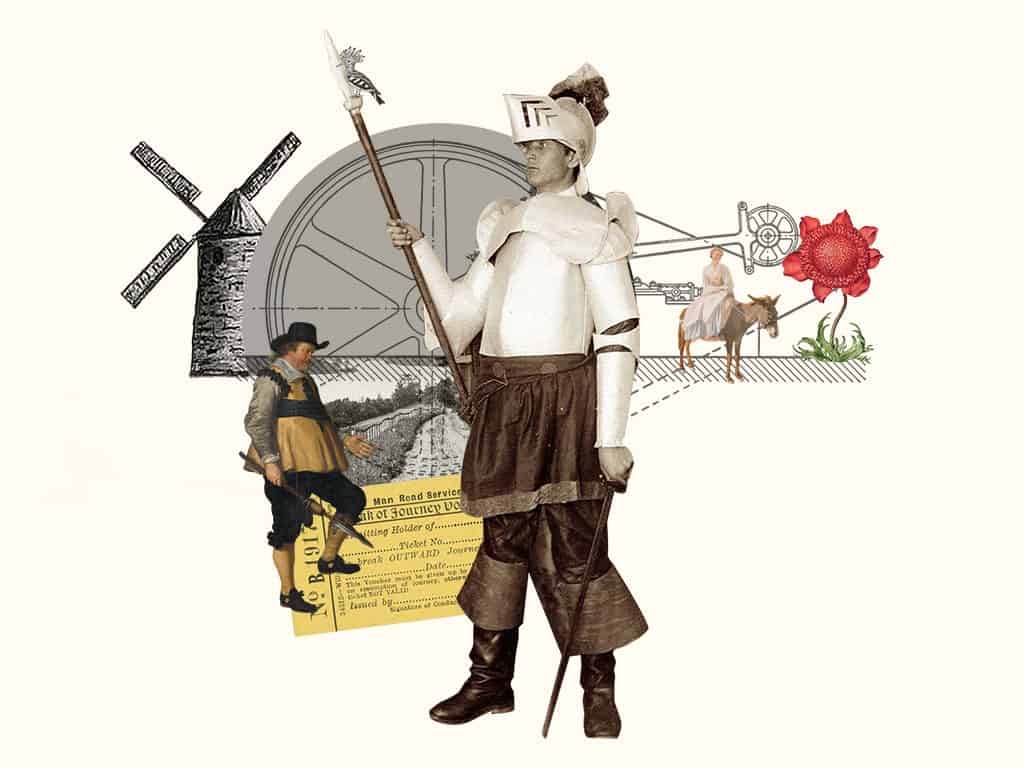
Don Quixote
Miguel de Cervantes
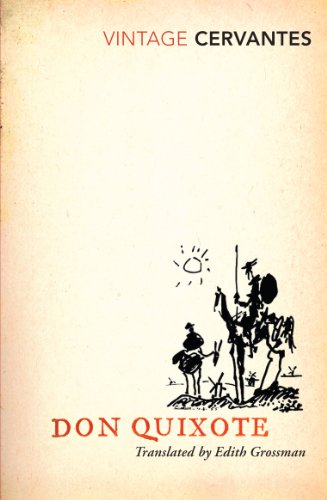
The accurate, readable, and funny 2003 translation by Edith Grossman is highly recommended. (Harper Collins, ISBN 0-06-018870-7). The John Ormsby translation (1885, with some more recent revisions) is available for free online and with convenient links to individual chapters, Don Quixote by Miguel de Cervantes - Free Online Book (learnlibrary.com)
Milan Kundera calls Cervantes “the founder of the modern era”...
It is impossible to summarize this vast, multi-layered novel, first published in two parts – in 1605 and 1615. Milan Kundera calls Cervantes “the founder of the modern era;” and indeed once students have cleared away the idea they may have that it’s an archaic and somewhat silly tale about a knight who fights with a windmill, they are likely to be astonished at how contemporary at least some aspects of the book feel. The text frequently draws attention to its own status as a work of fiction; Cervantes invents an Arabic Muslim historian to whom he attributes most of the narrative, casting himself as the discoverer of the manuscript rather than its author, and his prologue makes fun of the scholarly apparatus of translations and footnotes that accompany most “serious” works of literature. Tongue planted firmly in cheek, he leads us on an adventure that begins with the Don’s resolution to “become a knight errant and travel the world … righting all manner of wrongs” and ends with his renunciation of his quest and the books that inspired it, told over two parts. The second part, published 10 years after the first, is a metanarrative – written with the assumption that the first half of the book has been published and is widely read, and that the consequences of the resulting fame are now directly affecting Don Quixote and his squire Sancho in their subsequent adventures that make up book two.
Why This Text is Transformative?
Like Don Quixote, they [students] may be inspired by high ideals to advocate for causes to which they are deeply committed, only to find themselves met not with opportunities for heroism but by cynicism, bureaucracy, ridicule, and the insistent humdrum demands of everyday life.
Don Quixote is often called the first novel. Despite the humor that suffuses the tale, it is a serious and even a tragic work. The laughter the novel provokes, and the distance combined with affection we feel for its noble yet ridiculous protagonist as he attempts to live out his ideals in a decidedly unsympathetic world, provoke examination of themes that students will feel deeply. Many of them, in coming to college, have themselves set off on a grand adventure. Like Don Quixote, they may be inspired by high ideals to advocate for causes to which they are deeply committed, only to find themselves met not with opportunities for heroism but by cynicism, bureaucracy, ridicule, and the insistent humdrum demands of everyday life. In addition, although most classes will probably not have time to read more than short excerpts from the novel, the way the text draws attention to its own nature as a written artifact and highlights issues of interpretation throws into question the notion of authorship means that even short selections can give rise to rich conversations about reading, writing, understanding, and storytelling. Questions of this sort are also raised by the fact that it is apparently reading tales of knight errantry that has driven Don Quixote to his course of action in the world. If we read seriously, should we not be open to being changed by what we read?
A Focused Selection
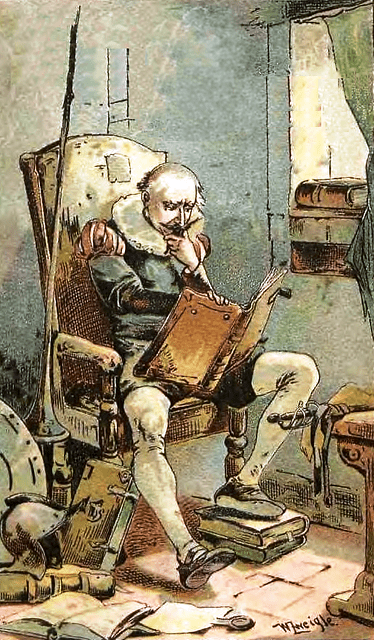
Don Quixote is highly episodic, and there is no one episode that is adequately representative of the whole. Having said this, chapters one through six (the first thirty pages or so of the novel), often known as Don Quixote’s “first sally,” are both an introduction to the whole book and a self-contained narrative. In these few pages Don Quixote first conceives of his mission; puts together his armor out of odds and ends; imaginatively transforms a woman from a village farm into the object of his adoration, the Lady Dulcinea of Toboso; spends time at an inn where the innkeeper, in an attempt to appease him and get him to leave, creates a ceremony and dubs him a knight; attempts to save a young servant being beaten by a farmer, with very unfortunate consequences; and is ridiculed and beaten by a group of merchants before being found and delivered back to his anxious niece and housekeeper by a compassionate friend. Many of the most prominent narrative characteristics of the text are also present in this section. The narrator begins the story speaking in the first person, positioning himself as a storyteller adopting a sympathetic but also skeptical view of his main character. We also encounter Don Quixote as a self-conscious storyteller creating his own narrative – inventing characters such as the Lady Dulcinea that he will need as the hero of a tale of chivalry, thinking of the manner in which he will be described by the “wise enchanter” who will someday chronicles his adventures. The short section ends with his friends examining the contents of his library, determined to burn the books that have caused him to lose his mind.
Study Questions
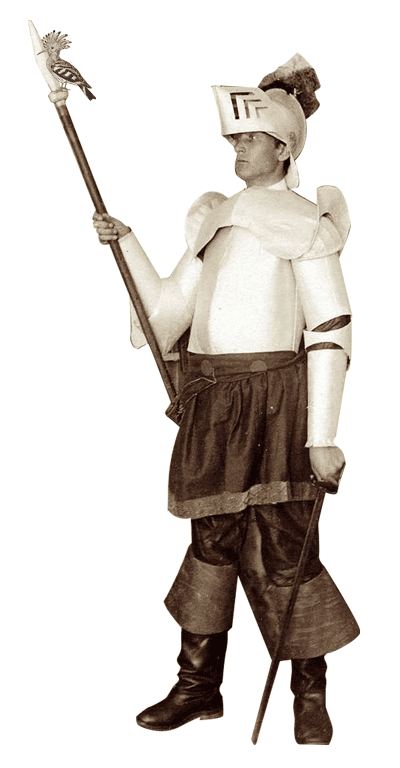
Based on a reading of only the “first sally” episode, questions that will confront and engage students include:
1) How are we/should we be influenced by the things we read? What does it mean to take a text seriously, if not going out an enacting it literally in the world?
2) How does one live out one’s ideals in a world that seems not welcome them? Is Don Quixote mad, or is there some other way to interpret his actions? Do most of us have commitments, beliefs or ideals that may seem mad to others?
3) Can one see the beautiful and the good in the world while also keeping one’s feet planted in reality? Where does the culpability lie when one’s attempts to do good have unintended consequences that are harmful? Have you ever done something in an attempt to help that made the situation worse?
Building Bridges
A Recommended Pairing
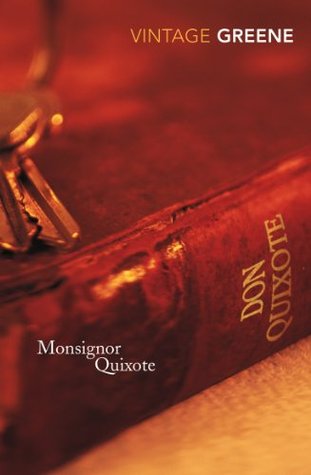
A wonderful short novel by Graham Greene, Monseigneur Quixote, recasts Cervantes’ magnum opus in a way that captures much of the humor and pathos in a more modern context, as the adventures of a Roman Catholic priest and a communist mayor taking to the road together in Spain during the Franco years. The richly imagined characters and their conversations make it clear that the issues that drive Don Quixote’s idealistic quest are not raised only in books of chivalry. How do we live with a commitment to the ideals of a religious faith or a political ideology which, though noble, may not fit easily with and may have unfortunate consequences in the unforgiving world in which we find ourselves? What difference does friendship make in our lives?
Supplemental Resources
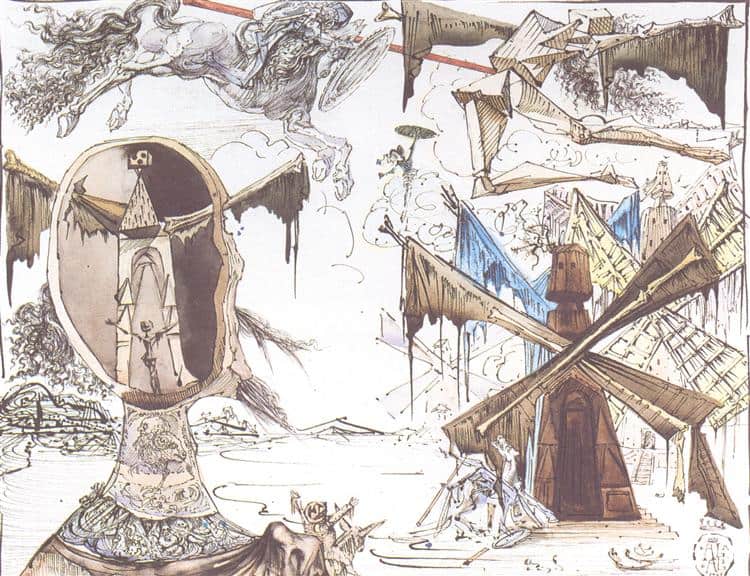
Don Quixote has been an inspiration for many visual artists. Spanish surrealist Salvador Dali returned to the novel multiple times throughout his long career, creating sketches, paintings, and sculptures of Don Quixote and Sancho, depicting important episodes in the book. A pairing of an episode with one of Dali’s works can lead to a stimulating discussion.
What details do students notice? What do his artistic choices suggest about his interpretation of the characters? To the extent that students are familiar with the story of Don Quixote, it is likely to be as it is filtered through the musical The Man of La Mancha. The musical has its own merits, and is framed by the interesting device of placing Cervantes on stage as a narrator, but of course it is impossible for it to capture much of the complexity of the book – and it alters the ending dramatically. Students may find it interesting to compare the two endings.
Text Mapping
Discipline Mapping
English/Composition Studies
Humanities
Philosophy & Religion
Page Contributor


